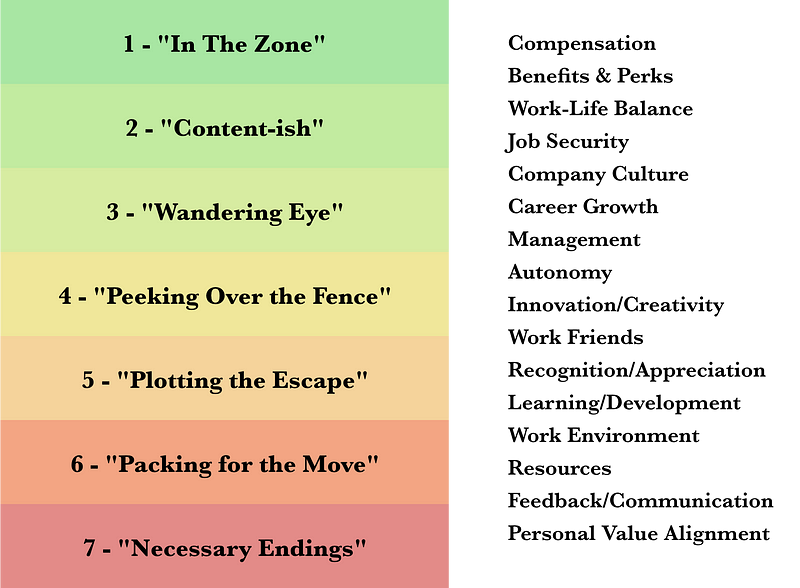At times in my career, I have been blessed to be “In The Zone” and seemingly working in my sweet spot — my “dream job.” Doing exciting and fulfilling things with other amazing people, having success, and meeting my personal and professional goals. But seasons change, challenges come, and I develop a “Wandering Eye,” or in a few cases, had to change as the job was changing or ending.
Over time, especially as I got into some technical and people leadership roles, I saw some patterns emerge and factors that lead to these patterns. I’ve shared some of these ideas (and they aren’t particularly unique) one-on-one with folks, but I wanted to write them down to refer back to and share with others.
For me, and others I’ve worked with, there seem to be 6–7 “stages” that we go through in our “job satisfaction continuum” — from #1 where things are really great (almost scary good), to #7 where, by personal choice or life situation, an immediate change was needed. Here is a list of how these stages might progress and the factors or formulas that help determine how and why to make a move.
Note: you will see some similarities to Maslow’s Hierarchy of Needs and/or Kübler-Ross’ Stages of Grief (M/KR), and that’s no accident — these theories made quite an impression on me early on and rubbed off a bit here.

Stage 1 — “In The Zone”
- This is that rare season of one’s career when you are fully engaged, doing great work, with great people, in the middle of your interests, talents, and gifts — you are enthusiastic about what you are doing and safe and content. It’s a time of doing valuable work at a sustainable pace, growing personally and professionally, and even perhaps advocating for the company and attracting others to join you.
- “I love my work, role, culture, compensation, benefits, team. I am engaged and committed. I would not consider leaving.”
- From a M/KR perspective, this is a position of Self Actualization and Acceptance where growth is possible and happening in very positive ways.
Stage 2 — “Content-ish” — Loyal but Slightly Dissatisfied
- The “new car” of a job has some first scratches or dents. There are some small (but manageable) issues with your workload, teams, tasks, or work-life balance. Growth or learning may not be moving forward as you had hoped. The compensation and benefits are satisfactory, but may not be meeting your needs or goals.
- “I’m mostly happy, but I have a few concerns or unmet aspirations.”
- M/KR-wise, this is a stage lower — impacting Esteem needs, beginings of Denial (start to see issues at work, but choose to focus on the positives)
Stage 3 — “Wandering Eye” — Exploring, but Still Invested
- There are some frustrating and identifiable issues present. Things may have stagnated with compensation, projects, career paths — “work is work” and paying some of the bills, but isn’t what you hoped for.
- Discussing issues with other team members and family/friends. Updating my network and resume.
- If the right offer came along, I would communicate and even interview
- “I like my job, but I’m open to new opportunities if they offer significant advantages.”
- M/KR — getting into the Bargaining (a raise or better project would help me stay longer,) and more basic Belongingness and Love Needs
Stage 4 — “Peeking Over the Fence” — Casually Seeking — Openly Discontented
- Things aren’t changing at work, so maybe I need a change. I’ve tried where I can to make things better where I’m at, but have not been successful. I’m not only not keeping up compensation and career-wise, but I feel like I am falling or well behind where I believe I should be with the goals I have set. It’s not good for me here.
- My search has gone from mostly passive and listening, to active and searching.
- “I’m not fulfilled here, and I’m actively looking for a better fit.”
- M/KR — approaching Anger, and basic Safety Needs
Stage 5 —”Plotting the Escape” — Actively Searching
- A change is clearly needed — soon. There is a deep frustration and feelings of not being valued and these feelings and the work are significantly impacting my life outside of work. Burnout is either present or imminent. Motivation is by sheer force of will. And no one seems to be listening or care at work.
- “I have a daily routine to search for opportunities, send out resumes and cover letters, and may be working with a recruiter or agency to assist.”
- M/KR — moving into Depression, not meeting basic Physiological Needs
Stage 6 —”Packing for the Move” — Preparing to Leave
- The next “train” that comes to the station will have me on it, no matter where it is going. I can’t afford to leave until I have something, but I am past being picky about what that next step might be, even if it is short-term. The burnout may be impacting my mental and even physical health — it is not good for me here. I may feel that I have missed earlier opportunities that I really should have taken. This is about more than money, but not not about money.
- “I’ll take the first/next thing that minimally meets my current needs.”
- M/KR — this is the other side of Acceptance (accepting there must be a change), and impacts several Physiological and Safety Needs
Stage 7 — “Necessary Ending”
- This ends today. Things are unwell and/or unsafe, even with no current options for what comes next. It would be better for me to be able to be away from the current situation and able to leave that behind and then move to dedicate the available time to figuring out what’s next.
- I need to place my well-being over job stability and income.
- “I can’t stay any longer, even if I don’t have another job lined up.”
- M/KR — this is the other side of Depression (there are no other options), and impacts many Physiological and Safety Needs
- This stage borrows its name from a very helpful book of the same name by Dr. Henry Cloud.
The 16 Factors that impact the Seven Stages
These are in no particular order, simply because the importance of one or another will depend on the individual and on their current stage of career and life. A very positive current state in one factor may go a long way to cover several of the others that are not the best. But the choices that people make in this area are complex decisions to make.
Compensation — competitive relative to other similar jobs in the area, raises, bonuses — that are regular, fair, and motivating
Benefits and Perks — insurance (health, dental, vision), retirement, paid time off, and more.
Work-Life Balance —Folks take a job to get the work done, and they also have an active life outside of work. Being able to fulfill responsibilities at work, and at home, and personally can exist in a balance that is a win-win for everyone. Having flexible work hours, the ability to work remote, time off, and a managable workload within agreed upon work hours, are all examples of this. Taking a guilt-free vacation or few days (or flex hours) off is a wonderful feeling.
Job Security — How is the company doing? Stable? How is my part of the company doing? How am I doing? Some companies have been around for 40+ years and have a long (and recent) history of success, and may even be growing. Other startup companies have 3–6 months of working capital and the future is excitingly uncertain. Depending on someone’s risk tolerance and financial/living situation, knowing that their job is stable, or not, is important. For more experienced people, their seniority or tenure can be either a comfort or an anchor (e.g., sunk cost fallacy).
Company Culture — This is primarily related to the internal culture of the company or group you are working in — what the company values in their employees, their approach to work and the work day, how supportive the leadership and team are of each other, how competitive people are with one another.
Career Growth Opportunities — Job Role and Responsibilities — All careers have different phases and roles that flow and grow as someone gains experience and becomes more attuned to their personal abilities and interests. To be able to work somewhere where there are clear paths of growth that extend through the “next” and further roles and opportunities in the company. While this certainly can be related to compensation, it is also more about advancing in the types of tasks and responsibility and even influence one has in the company.
Immediate Management and Leadership Style and Structure — It’s been said that “people don’t leave bad jobs, they leave bad managers” or some version of that. This is probably an oversimplification of this factor, but not far off. Direct leadership and management that has high expectations and accountability of their team, but is also very fair and respectful and enabling/empowering of their work, can help to mitigate many other factors
Autonomy and Empowerment — Especially in professional and creative roles, being told the main goal and acceptance criteria for a particular task or feature (i.e. “what do do”), but being given a good deal of latitude on how best to accomplish the work (i.e. “how to do it”) can give a great deal of satisfaction in daily tasks. This increases as the experience and skill of the person builds up.
Innovation and Creativity — This is even a step up from Autonomy in that you may start with the high-level goals or targets of what would like to be accomplished, but even have some agency in the “what to dos,” with some freedom given to suggest and explore creative and innovative ideas and options that may never have been done before.
Friends and Relationships at Work — Looking forward to seeing the people you work with every day can be a very important factor for many people. Sometimes it’s great relationships at work, and other times this can extend beyond work hours and into out-of-work activities and interactions. People may stay in a position that is not ideal in many other areas, to continue to work with people they know and really like.
Recognition and Appreciation of Work and Accomplishments — It is important for folks to know their work is valuable and appreciated. In a setting where regular acknowledgment and appreciation of important milestones and efforts, can make a big difference in the feelings of worth and value on the team. While working - especially on remote teams — and just getting one ticket after another and completing them, one can feel very isolated and unseen or unvalued.
Learning and Development — Hardly any jobs today have an endpoint for learning and development. Especially in technical work where the hardware and software and capabilities change so quickly, being given time and resources to continue learning new things at work is very compelling. Even if the current tasks are not as professionally interesting or compelling, if there are opportunities to learn and grow, then this could lead to the next role or opportunity.
Work Environment and Resources — The physical environment that people work in, and the quality of tools and resources they have to do their jobs, can be a big enabler. I’ve known folks who have had very outdated and unstable computers to work on (some would crash several times a day and they had learned to work around it). On the other hand, I’ve known of some amazing shared work and office environments that had all kinds of amenities, food/cafeteria, quiet work areas, child care, work-out rooms, easy parking, attractive working areas, etc. The point is the environment you work in, and the tools and resources you have to get your job done, matter a lot.
Feedback and Communication — Being able to receive regular and daily feedback on one’s contributions and performance is very important to a positive feeling of self-worth and safety. Having regular communication among peers, the team, and the broader company helps keep people “in the know” for what is happening and how things are trending.
Company Vision, Mission, and Reputation — I’ve known many folks whose dream job and goal was to work for XYZ Company — whether it was Microsoft, or Apple, or Google, or NASA, or a University, etc.- the name and reputation of a company can be very important to folks. Even for smaller or local companies, the history and reputation of a company can be a big motivator for people seeking and staying at a job.
Aligned with Personal Values — Purpose and Meaning — How much to I believe in the work that the company is doing? In my area, in the community, in the world. People will do work (even volunteer/pro-bono) for community or non-profit groups that are a close fit with their personal beliefs and passions. The converse is being very well paid, but for a business or enterprise that is doing things that profit off of activities or products that one feels are quite opposed to their personal view of the world — while perhaps not “illegial” they could be on very personally questionable moral or other grounds. How proudly to you tell friends and family what you do each day, and what your company does?




Leave a comment